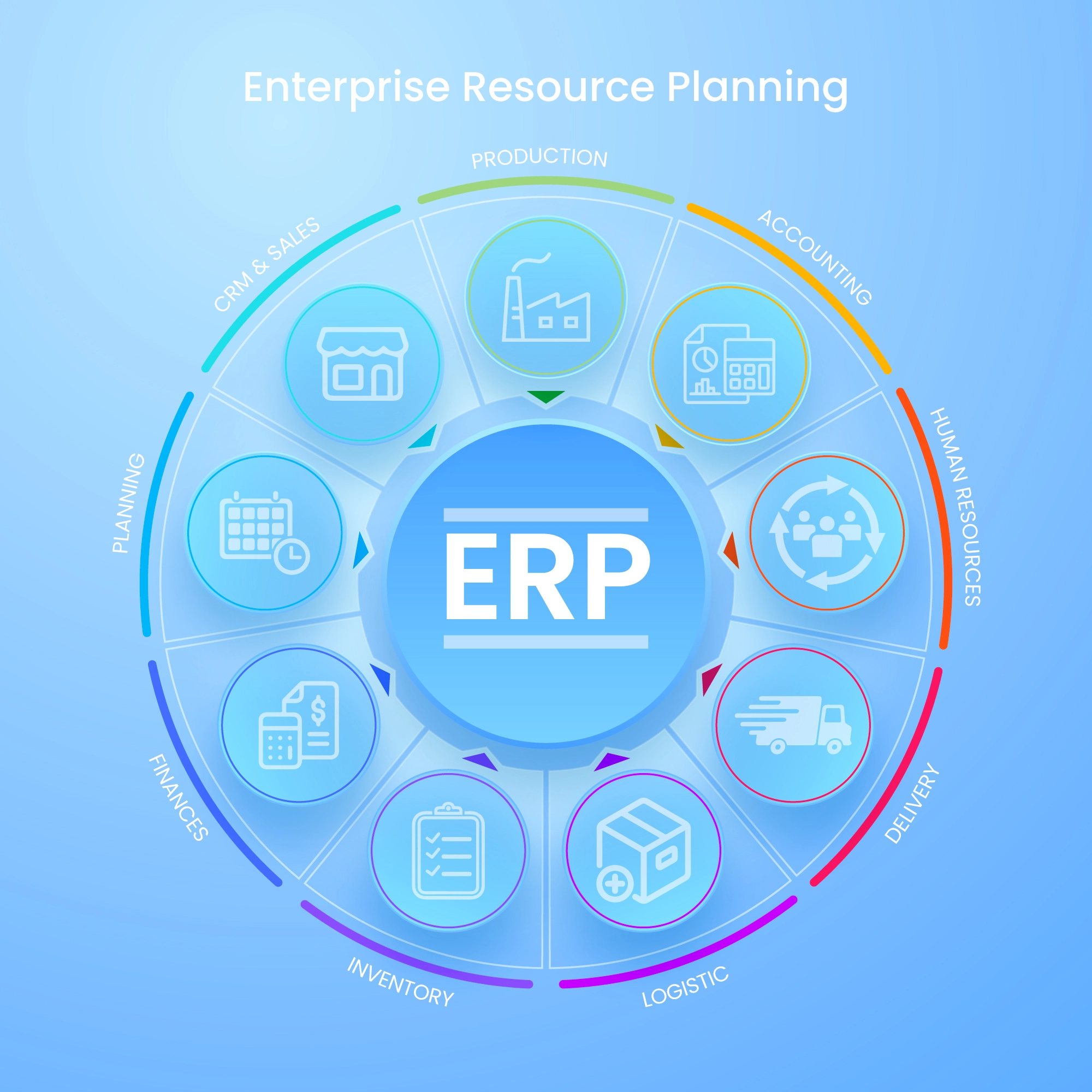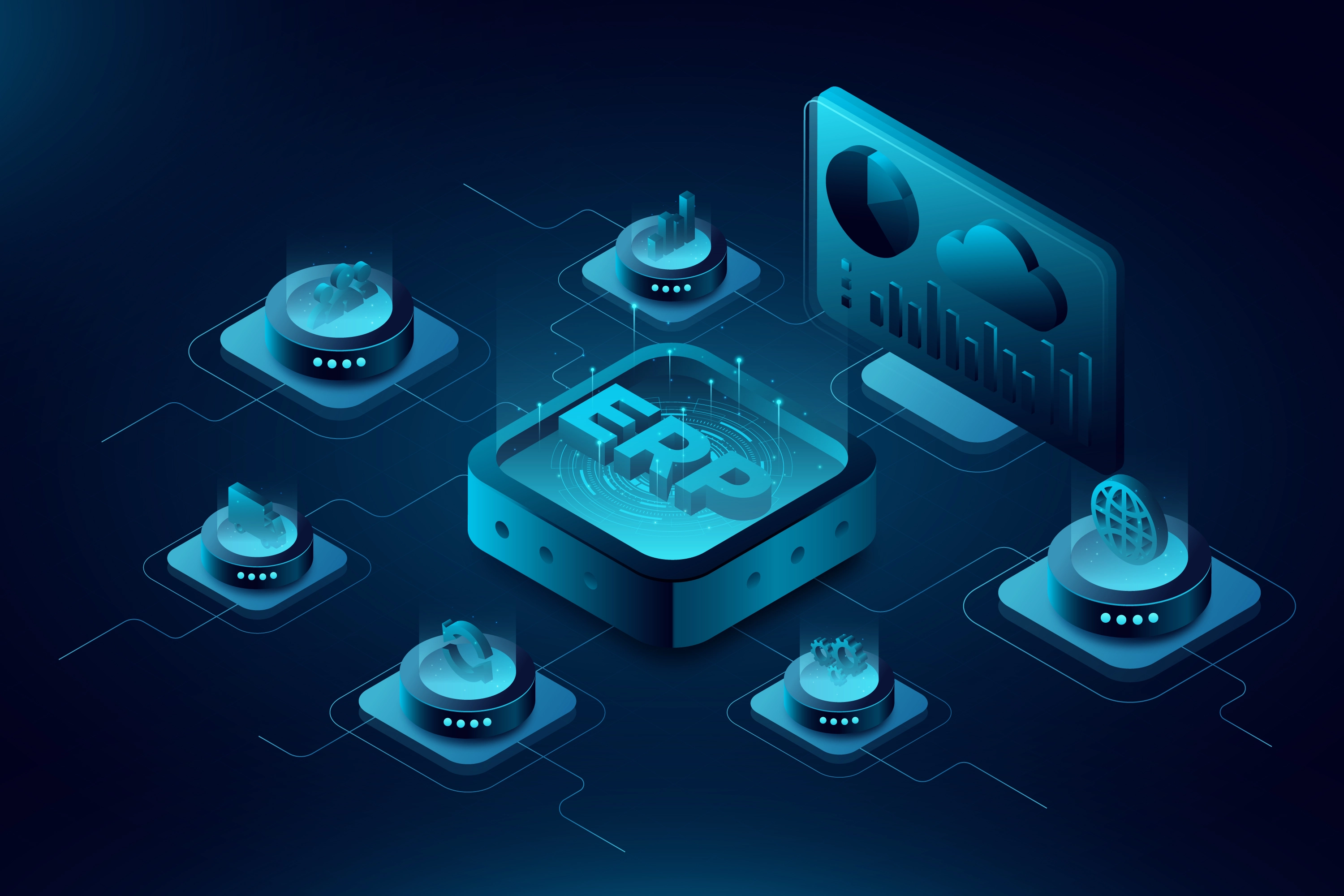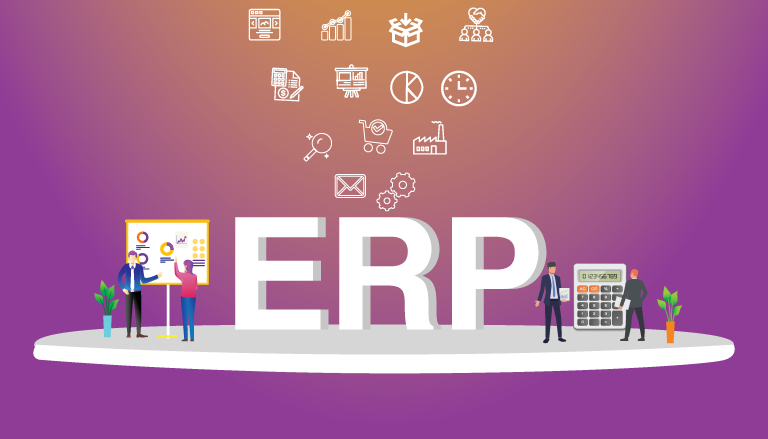What is Enterprise Resource Planning (ERP) system
In the modern business world, the importance of efficiency and organization is crucial for the success and competitive edge of enterprises. One of the prominent technological tools contributing to achieving this goal is the Enterprise Resource Planning (ERP) system.

What is Enterprise Resource Planning (ERP) system?
In the modern business world, the importance of efficiency and organization is crucial for the success and competitive edge of enterprises. One of the prominent technological tools contributing to achieving this goal is the Enterprise Resource Planning (ERP) system.
The ERP system is a notable example of technological innovation that combines the latest advancements in information technology with the necessity to enhance resource management and operations within enterprises. This comprehensive system aims to coordinate and integrate all company or organization processes into a unified unit, making data and operations accessible and coherent for all departments and employees.
In this article, we will delve into the realm of ERP systems to understand their components, significance, and how they can positively impact the performance and efficiency of enterprises. We will explore the details of this system and how it can be a fundamental driver in achieving company objectives and enhancing competitiveness in the global business arena.
By uncovering the secrets of ERP system success and its multiple benefits, we shed light on how to use this modern technology as a powerful strategic tool to improve work management and achieve growth and sustainability goals.
The journey of exploring the Enterprise Resource Planning system leads us into a world of continuous improvement and renewed efficiency. Let's embark together on this exploration to discover its role and impact in shaping the future of businesses.
The definition of Enterprise Resource Planning (ERP) system:
The Enterprise Resource Planning (ERP) system is an integrated software system designed to organize, unify, and manage various core processes and functions within enterprises and companies. ERP systems work to integrate data and operations from different departments and organizational units within the enterprise, such as production, inventory, sales, accounting, and human resources, into a single system.
The goal of an ERP system is to improve work efficiency, increase transparency, and enhance coordination among different processes and departments within the organization. This system assists in providing a comprehensive view of data and operations, enabling leaders and decision-makers to make better-informed decisions supported by accurate and unified information.
Moreover, ERP systems facilitate improved coordination of operations, cost reduction, and decreased time required to accomplish tasks. By reducing manual and repetitive work and enabling quick and accurate access to vital data, these systems contribute to enhancing service quality and increasing customer satisfaction.
In summary, the Enterprise Resource Planning (ERP) system is considered a fundamental tool for companies and organizations to improve efficiency, achieve coordination, and integration among different operations, thereby supporting strategic decision-making and enhancing adaptability in a changing business environment.

What is the importance of Enterprise Resource Planning (ERP) system?
The importance of Enterprise Resource Planning (ERP) system is evident in several aspects that positively impact the functioning of enterprises and businesses, notably:
- • Process Integration:
ERP enables the integration and unification of an entire company's or organization's operations into a single platform. This integration reduces data gaps and enhances information flow between different departments, promoting transparency and coordination among operations.
- • Increased Efficiency:
ERP contributes to enhancing work efficiency by reducing manual and repetitive tasks. The comprehensive integration and organization of operations and data help minimize errors and expedite decision-making processes.
- • Comprehensive Insight:
ERP provides a comprehensive view of all facets of the enterprise by consolidating data from various departments into unified and understandable reports. This assists leaders in making better decisions based on accurate and reliable information.
- • Improved Planning and Forecasting:
ERP aids in enhancing planning and forecasting by processing historical data and providing data-driven analytics. This enables organizations to make strategic decisions based on precise projections.
- • Enhanced Customer Experience:
By improving efficiency and coordination among operations, ERP systems can enhance the customer experience by delivering services more efficiently and swiftly, thereby increasing customer satisfaction.
- • Increased Adaptability:
ERP offers flexibility to organizations by allowing adjustments to operations and adaptation to market changes or company needs, enabling a quicker response to new challenges.
In summary, the significance of an Enterprise Resource Planning (ERP) system lies in achieving integration, efficiency, and transparency within the organization, thereby strengthening the capability to make strategic decisions and attain sustainable success and growth.

What are the components of an Enterprise Resource Planning (ERP) system?
An ERP system consists of several components and modules that work together to provide integration and coordination in managing various aspects of a company or organization. While the components may slightly vary depending on the system provider or each company's needs, there are typically fundamental components that include:
- • Human Resource Management (HRM):
This module enables the management of employee information such as payroll data, leave records, performance evaluations, recruitment, and training.
- • Customer Relationship Management (CRM):
This module facilitates managing customer-related information such as interaction history, sales, and customer service.
- • Supply Chain Management (SCM):
Allows tracking and managing all stages of the supply chain from suppliers to the manufacturing process and then to customers.
- • Operations Management:
Manages the company's daily operations such as production, inventory, and resource distribution.
- • Financial Management:
Manages financial operations including budgeting, accounting, financial reports, and more.
- • Reporting and Analytics:
Provides detailed analysis and important reports aiding in understanding company performance and strategic decision-making.
- • Project Management:
Enables tracking and managing various projects, tasks, and deadlines.
- • Resource Planning:
Identifies and allocates resources among different departments and projects within the company.
- • Integration and Database:
Ensures seamless and unified data exchange among various modules.
These are succinct core components of an ERP system, which can be tailored according to the needs and requirements of each company or organization.
Benefits of investing in an Enterprise Resource Planning (ERP) system:
Investing in an ERP system brings numerous benefits and improvements to companies and organizations, including:
- • Enhanced Operational Efficiency:
ERP reduces manual and repetitive tasks, thereby increasing operational efficiency within the organization. It accelerates workflow and diminishes administrative errors.
- • Data and Process Integration:
ERP provides consistent integration of data and processes across various sections of the enterprise, facilitating communication and coordination between different departments.
- • Increased Transparency and Accurate Reporting:
ERP contributes to providing accurate and transparent data, simplifying report generation, performance analysis, and strategic decision-making.
- • Improved Inventory Management:
The ERP system allows precise monitoring and efficient management of inventory, reducing storage costs and enhancing distribution accuracy.
- • Enhanced Customer Experience:
ERP can improve customer service by streamlining internal coordination, ensuring timely deliveries, and offering high-quality products and services.
- • Increased Employee Satisfaction:
By streamlining operations and enhancing efficiency, ERP can lead to increased employee satisfaction and an improved work environment.
- • Cost Reduction and Profitability:
Efficiency improvements and accurate planning through ERP can reduce operational costs and increase profitability for the company.
- • Improved Strategic Planning:
ERP provides detailed data and reports aiding in trend analysis and forecasting, assisting leaders in making strategic decisions.
In summary, an Enterprise Resource Planning (ERP) system represents a powerful tool that enhances productivity, organization, and efficiency within enterprises, assisting in achieving strategic goals and enhancing competitiveness in the market.

What are the challenges you may face when implementing an Enterprise Resource Planning (ERP) system?
Implementing an Enterprise Resource Planning (ERP) system can encounter several challenges and difficulties that need to be overcome to ensure the success and effectiveness of this implementation. Some of these challenges include:
- • Implementation Cost:
Implementing an ERP system represents a significant investment, encompassing software licensing, system customization, and employee training. This can be a substantial financial challenge for small and medium-sized companies.
- • Resistance to Change:
ERP system implementation might face resistance from some employees or administrators who prefer traditional methods. Overcoming this requires efforts to incentivize change and train employees on the new system.
- • System Customization:
Implementing an ERP system might require customization for specific company requirements. This could be challenging due to the necessity to adapt the system to the company's operations and individual needs.
- • Change Management:
These challenges involve changes in the company's operations and internal culture. Providing support and encouragement for change among all employees can be difficult.
- • Selecting the Right System:
Choosing the appropriate system itself poses a challenge, as the company needs to select a system that aligns with its needs and can effectively support its operations.
- • Ensuring Business Continuity:
During the transition to an ERP system, the company may face challenges in ensuring business continuity, especially during the transition and training periods.
- • Employee Training and Skill Development:
The success of an ERP system requires training employees to use the new system. Ensuring adequate training for a suitable team of employees to understand and effectively use the system can be a challenge.
Overcoming these challenges necessitates thorough planning, effective coordination, support from senior management, along with efficient strategies to achieve successful ERP system implementation within the organization.

The most famous examples of companies that have benefited from ERP systems in their success:
There are several examples of the most successful companies globally that have achieved remarkable success with the help of an Enterprise Resource Planning (ERP) system, such as:
- • Apple Inc.:
Apple relies on an ERP system to coordinate supply chains and manage inventory. Its use of an ERP system enables effective tracking of product demand and efficient distribution.
- • Procter & Gamble (P&G):
P&G utilized an ERP system to integrate its operations and enhance communication between different departments. This system contributed to improving production planning and product distribution.
- • Amazon:
Amazon relies on an ERP system to manage its vast inventory and improve supply chains for efficient and rapid delivery services.
- • Microsoft:
Microsoft uses an ERP system to streamline its internal operations, facilitate communication between various departments, and manage human resources.
- • Toyota:
Toyota used an ERP system to enhance its production, supply chain planning, and logistics management.
These companies are successful examples of applying ERP systems in their daily operations and activities. This application has contributed to improving efficiency, unifying operations, and enhancing control within these companies.

Tips for successful implementation of an ERP system:
There are several tips to achieve the best results from investing in an ERP system:
- • Precisely Define Goals and Requirements:
Before commencing the implementation process, it's crucial to precisely define the goals and requirements that the system must meet. This ensures effective resource allocation and focused efforts.
- • Encourage Communication and Transparency:
Continuous communication among all involved parties, including technical teams, management, and end-users, should be encouraged throughout the implementation process.
- • Provide Training and Education:
Adequate training for employees involved with the new system is necessary to ensure their thorough understanding of new processes and how to effectively utilize the system.
- • Thorough and Phased Planning:
Implementing the system in phases is advisable to minimize the impact on company operations and ensure alignment with the company's requirements.
- • Select the Right Team:
Choosing the right team to implement and manage the system is critical. Qualified and experienced individuals in ERP applications should be selected.
- • Continuous Review and Assessment:
Regular reviews and assessments of the system's performance and achievement of set objectives are recommended. Necessary improvements should be made as required.
- • Provide Ongoing Support:
Continuous technical and operational support should be provided after the system implementation to address any problems or challenges that arise during actual usage.
- • Adaptability and Flexibility:
The company should be prepared to adapt to changes and pressures that may occur during the system implementation process and be able to adjust quickly.
Implementing these tips can significantly contribute to the success of ERP system implementation and achieving the specified objectives of the company or organization.
Conclusion:
The implementation of an Enterprise Resource Planning (ERP) system represents a crucial strategic step for companies and organizations aiming to enhance their efficiency and increase competitiveness in today's business landscape. By integrating operations and unifying data, an ERP system presents significant opportunities for improving productivity and making informed decisions based on accurate and comprehensive information.
Despite the numerous benefits offered by an ERP system, its implementation requires thorough planning and effective coordination. It necessitates a specialized team, provision of adequate training, effective communication, and readiness to adapt to the changes that may arise.
Through continuous improvement and ongoing learning, companies can greatly benefit from an ERP system to achieve their operational and strategic objectives, enhancing their position in the growing and competitive business market.



